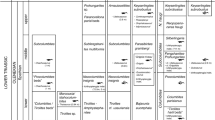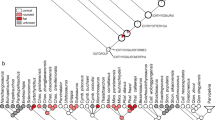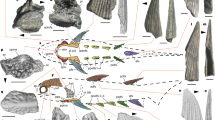Abstract
Ichthyosaurs, extinct marine reptiles superficially similar to sharks and dolphins, flourished throughout most of the Mesozoic, but are best represented in the early Jurassic1–5. Hundreds of skeletons are known, principally from the Lower Liassic (Hettangian, Sinemurian and Lower Pleinsbachian) of south-west England and the Upper Liassic (Toarcian) of southern Germany6–9. Among the most specialized is Eurhinosaurus, unique for its long rostrum and shortened mandible, which confers a striking resemblance to the modern swordfish, Xiphias1,5,10. Known only from the Upper Liassic of Germany, this monotypic genus, like most fossil species, appears suddenly, without antecedents11–14. The recent discovery of a geologically older (Lower Liassic) ichthyosaur with a partially extended rostrum is therefore of considerable interest. As described here, this specimen, which is too large to be part of a growth series of Eurhinosaurus, appears to be ancestral, and could have given rise to Eurhinosaurus through changes in growth rates of the rostrum and mandible.
This is a preview of subscription content, access via your institution
Access options
Subscribe to this journal
Receive 51 print issues and online access
$199.00 per year
only $3.90 per issue
Buy this article
- Purchase on Springer Link
- Instant access to full article PDF
Prices may be subject to local taxes which are calculated during checkout
Similar content being viewed by others
References
Von Huene, F. Die Ichthyosaurier des Lias und ihre Zusammenhänge (Verlag von Gebrüder, Borntraeger, Berlin, 1922).
McGowan, C. Life Sci. Contr. R. Ont. Mus. 93, 1–37 (1974a).
McGowan, C. Life Sci. Contr. R. Ont. Mus. 100, 1–30 (1974b).
McGowan, C. J. Paleont. 52, 1155–1162 (1978).
McGowan, C. Palaeontographica 166, 93–135 (1979).
Hauff, B. Palaeontographica 64, 1–42 (1921).
Hauff, B. Das Holzmadenbuch (F. Rau, Öhringen, 1953).
Arkell, W. J. The Jurassic System in Great Britain (Oxford University Press, 1933).
Palmer, C. P. Newsl. Stratigr. 2, 45–54 (1972).
Jäger, G. Nova Ada Akad. Caesar, Leop. Carol. 25, 937–967 (1856).
Darwin, C. On the Origin of Species (Murray, London, 1859).
Eldredge, N. & Gould, S. J. in Models in Paleobiology (ed. Schopf, T. J.) 82–115 (Freeman, Cooper, San Francisco, 1972).
Gould, S. J. Paleobiology 11, 2–12 (1985).
Gingerich, P. D. Paleobiology 11, 27–41 (1985).
McGowan, C. Can. J. Earth Sci. 13, 668–683 (1976).
McGowan, C. Life Sci. occ. Pap. R. Ont. Mus. 20, 1–8 (1972).
Arata, G. F. Bull. mar. Sci. Gulf Caribb. 4, 183–243 (1954).
Yabe, H., Ueyanagi, S., Kikawa, S. & Watanabe, H. Rep. Nankai reg. Fish Res. Lab. 10, 107–150 (1959).
Markle, G. E. U.S. Dept. Commerce, NOAA tech. Rep. NMFS SSRF–675, 252–260 (1974).
Author information
Authors and Affiliations
Rights and permissions
About this article
Cite this article
McGowan, C. A putative ancestor for the swordfish-like ichthyosaur Eurhinosaurus. Nature 322, 454–456 (1986). https://doi.org/10.1038/322454a0
Received:
Accepted:
Issue Date:
DOI: https://doi.org/10.1038/322454a0
This article is cited by
-
Ichthyosauria: their diversity, distribution, and phylogeny
Paläontologische Zeitschrift (2000)
-
Sea-dragons all aswim
Nature (1989)
Comments
By submitting a comment you agree to abide by our Terms and Community Guidelines. If you find something abusive or that does not comply with our terms or guidelines please flag it as inappropriate.



